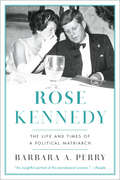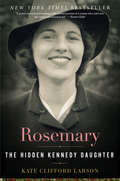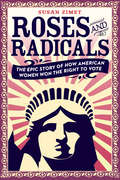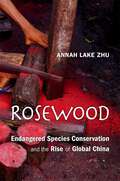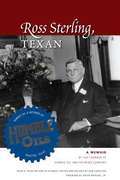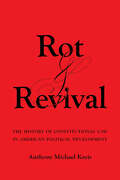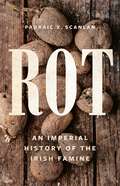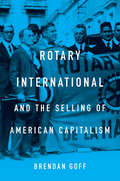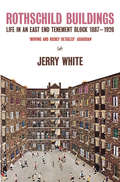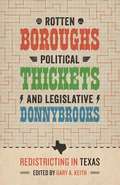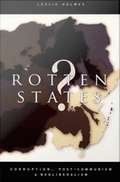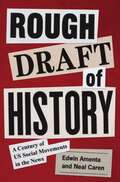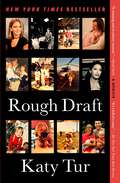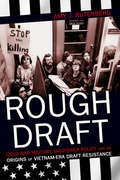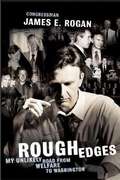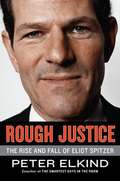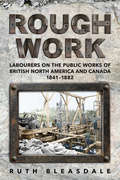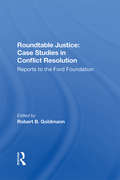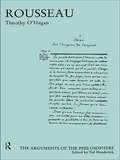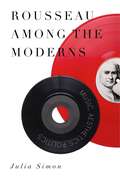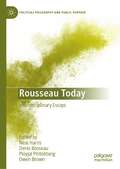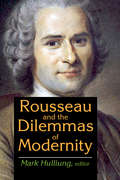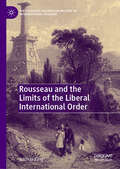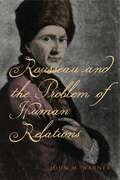- Table View
- List View
Rose Kennedy: The Life and Times of a Political Matriarch
by Barbara A. Perry"An insightful portrait of this paradoxical woman."--People In her compelling and intimate portrait, presidential historian Barbara A. Perry captures Rose Kennedy's essential contributions to the incomparable Kennedy dynasty. This biography--the first to draw on an invaluable cache of Rose's newly released diaries and letters--unearths the complexities behind the impeccable persona she showed the world. The woman who emerges in these pages is a fascinating character: savvy about her family's reputation and resilient enough to persevere through the unfathomable tragedies that befell her. As a young woman, she defied her father, Boston mayor John Fitzgerald, by marrying ambitious businessman Joseph Kennedy. During Joe's diplomatic career, she began carefully calibrating her family's image, stage-managing photo shoots and interviews of her nine children and herself. After husband Joe's isolationist views on the eve of World War II made him a political liability, Rose took to the campaign trail for son Jack. Her perfectionism, initially a response to the strictures imposed on Catholic women, ultimately created a family portrait that resonated in modern politics and media. Perry's account looks past the fanfare, poignantly revealing the matriarch's vulnerability. Rose sought solace from crushing personal tragedies and a philandering husband in prayer, habitual shopping, travel, and medication. Initially ashamed and afraid of daughter Rosemary's mental disability, Rose ultimately shined a light on the affliction, raising millions of dollars for disabled children. An indefatigable campaigner for Jack, Bobby, and Teddy, she had an unshakable Catholic faith that informed their compassionate social policies and her daughters' philanthropies. The definitive biography, Rose Kennedy provides unequaled access to the life of a remarkable woman who witnessed a century of history and masked her family's more inconvenient truths while capturing the American imagination.
Rosemary: The Hidden Kennedy Daughter
by Prof. Kate Clifford LarsonThey were the most prominent American family of the twentieth century. The daughter they secreted away made all the difference.<P><P> Joe and Rose Kennedy's strikingly beautiful daughter Rosemary attended exclusive schools, was presented as a debutante to the Queen of England, and traveled the world with her high-spirited sisters. And yet, Rosemary was intellectually disabled -- a secret fiercely guarded by her powerful and glamorous family. Major new sources -- Rose Kennedy's diaries and correspondence, school and doctors' letters, and exclusive family interviews -- bring Rosemary alive as a girl adored but left far behind by her competitive siblings. Kate Larson reveals both the sensitive care Rose and Joe gave to Rosemary and then -- as the family's standing reached an apex -- the often desperate and duplicitous arrangements the Kennedys made to keep her away from home as she became increasingly intractable in her early twenties. Finally, Larson illuminates Joe's decision to have Rosemary lobotomized at age twenty-three, and the family's complicity in keeping the secret. Rosemary delivers a profoundly moving coda: JFK visited Rosemary for the first time while campaigning in the Midwest; she had been living isolated in a Wisconsin institution for nearly twenty years. Only then did the siblings understand what had happened to Rosemary and bring her home for loving family visits. It was a reckoning that inspired them to direct attention to the plight of the disabled, transforming the lives of millions.
Roses and Radicals: The Epic Story of How American Women Won the Right to Vote
by Todd Hasak-Lowy Susan ZimetThe United States of America is almost 250 years old, but American women won the right to vote less than a hundred years ago. <P><P>And when the controversial nineteenth amendment to the U.S. Constitution-the one granting suffrage to women-was finally ratified in 1920, it passed by a mere one-vote margin. <P><P>The amendment only succeeded because a courageous group of women had been relentlessly demanding the right to vote for more than seventy years. The leaders of the suffrage movement are heroes who were fearless in the face of ridicule, arrest, imprisonment, and even torture. Many of them devoted themselves to the cause knowing they wouldn't live to cast a ballot. <P><P>The story of women's suffrage is epic, frustrating, and as complex as the women who fought for it. Illustrated with portraits, period cartoons, and other images, Roses and Radicals celebrates this captivating yet overlooked piece of American history and the women who made it happen.
Rosewood: Endangered Species Conservation and the Rise of Global China
by Annah Lake ZhuA riveting study of the booming rosewood trade between China and Madagascar uncovers an alternative approach to environmentalism that disrupts Western models. Rosewood is the world’s most trafficked endangered species by value, accounting for larger outlays than ivory, rhino horn, and big cats put together. Nearly all rosewood logs are sent to China, fueling a $26 billion market for classically styled furniture. Vast expeditions across Asia and Africa search for the majestic timber, and legions of Chinese ships sail for Madagascar, where rosewood is purchased straight from the forest. The international response has been to interdict the trade, but in this incisive account Annah Lake Zhu suggests that environmentalists have misunderstood both the intent and the effect of China’s appetite for rosewood, causing social and ecological damage in the process. For one thing, Chinese consumers are understandably seeking to reclaim their cultural heritage, restoring a centuries-old tradition of home furnishing that the Cultural Revolution had condemned. In addition, Chinese firms are investing in environmental preservation. Far from simply exploiting the tree, businesses are carefully managing valuable forests and experimenting with extensive new plantings. This sustainable-use paradigm differs dramatically from the conservation norms preferred by Western-dominated NGOs, whose trade bans have prompted speculation and high prices, even encouraging criminal activity. Meanwhile, attempts to arm conservation task forces—militias meant to guard the forests—have backfired. Drawing on years of fieldwork in China and Madagascar, Rosewood upends the pieties of the global aid industry. Zhu offers a rigorous look at what environmentalism and biodiversity protection might look like in a world no longer dominated by the West.
Ross Sterling, Texan: A Memoir by the Founder of Humble Oil and Refining Company
by Ed Kilman Ross S. SterlingBorn on a farm near Anahuac, Texas, in 1875 and possessed of only a fourth-grade education, Ross Sterling was one of the most successful Texans of his generation. Driven by a relentless work ethic, he become a wealthy oilman, banker, newspaper publisher, and, from 1931 to 1933, one-term governor of Texas. Sterling was the principal founder of the Humble Oil and Refining Company, which eventually became the largest division of the ExxonMobil Corporation, as well as the owner of the Houston Post. <P><P> Eager to "preserve a narrative record of his life and deeds," Ross Sterling hired Ed Kilman, an old friend and editorial page editor of the Houston Post, to write his biography. Though the book was nearly finished before Sterling's death in 1949, it never found a publisher due to Kilman's florid writing style and overly hagiographic portrayal of Sterling.
Rot and Revival: The History of Constitutional Law in American Political Development
by Anthony Michael KreisRot and Revival is one of the first scholarly works to comprehensively theorize and document how politics make American constitutional law and how the courts affect the path of partisan politics. Rejecting the idea that the Constitution's significance and interpretation can be divorced from contemporary political realities, Anthony Michael Kreis explains how American constitutional law reflects the ideological commitments of dominant political coalitions, the consequences of major public policy choices, and the influences of intervening social movements. Drawing on rich historical research and political science methodologies, Kreis convincingly demonstrates that the courts have never been—and cannot be—institutions lying outside the currents of national politics.
Rot: An Imperial History of the Irish Famine
by Padraic X. ScanlanA &“stunning&” (Maya Jasanoff, author of The Dawn Watch) and revelatory new history of the Irish Great Famine, showing how the British Empire caused Ireland&’s most infamous disaster In 1845, European potato fields from Spain to Scandinavia were attacked by a novel pathogen. But it was only in Ireland, then part of the United Kingdom, that the blight&’s devastation reached apocalyptic levels, leaving more than a million people dead and forcing millions more to emigrate. In Rot, historian Padraic X. Scanlan offers the definitive account of the Great Famine, showing how Ireland&’s place in the United Kingdom and the British Empire made it uniquely vulnerable to starvation. Ireland&’s overreliance on the potato was a desperate adaptation to an unstable and unequal marketplace created by British colonialism. The empire&’s laissez-faire economic policies saw Ireland exporting livestock and grain even as its people starved. When famine struck, relief efforts were premised on the idea that only free markets and wage labor could save the Irish. Ireland&’s wretchedness, before and during the Great Famine, was often blamed on Irish backwardness, but in fact, it resulted from the British Empire&’s embrace of modern capitalism. Uncovering the disaster&’s roots in Britain&’s deep imperial faith in markets, commerce, and capitalism, Rot reshapes our understanding of the Great Famine and its tragic legacy.
Rotary International and the Selling of American Capitalism
by Brendan GoffA new history of Rotary International shows how the organization reinforced capitalist values and cultural practices at home and tried to remake the world in the idealized image of Main Street America. Rotary International was born in Chicago in 1905. By the time World War II was over, the organization had made good on its promise to “girdle the globe.” Rotary International and the Selling of American Capitalism explores the meteoric rise of a local service club that brought missionary zeal to the spread of American-style economics and civic ideals. Brendan Goff traces Rotary’s ideological roots to the business progressivism and cultural internationalism of the United States in the early twentieth century. The key idea was that community service was intrinsic to a capitalist way of life. The tone of “service above self” was often religious, but, as Rotary looked abroad, it embraced Woodrow Wilson’s secular message of collective security and international cooperation: civic internationalism was the businessman’s version of the Christian imperial civilizing mission, performed outside the state apparatus. The target of this mission was both domestic and global. The Rotarian, the organization’s publication, encouraged Americans to see the world as friendly to Main Street values, and Rotary worked with US corporations to export those values. Case studies of Rotary activities in Tokyo and Havana show the group paving the way for encroachments of US power—economic, political, and cultural—during the interwar years. Rotary’s evangelism on behalf of market-friendly philanthropy and volunteerism reflected a genuine belief in peacemaking through the world’s “parliament of businessmen.” But, as Goff makes clear, Rotary also reinforced American power and interests, demonstrating the tension at the core of US-led internationalism.
Rothschild Buildings: Life in an East-End Tenement Block 1887 - 1920
by Jerry WhiteWinner of the Jewish Chronicle Harold H. Wingate Literary Award.Rothschild Buildings were typical of the 'model dwellings for the working classes' which were such an important part of the response to late-Victorian London's housing problem. They were built for poor but respectable Jewish immigrants from Eastern Europe, and the community which put down roots there was to be characteristic of the East End Jewish working class in its formative years. By talking to people who grew up in the Buildings in the 1890s and after, and using untapped documentary evidence from a wide range of public and private sources, the author re-creates the richly detailed life of that community and its relations with the economy and culture around it. The book shows how cramped and austere housing was made into homes; how the mechanism of class domination, of which the Buildings were part, was both accepted and fought against; how a close community was riven with constantly shifting tensions; and how that community co-existed in surprising ways with the East End casual poor of 'outcast London'. It provides unique and fascinating insights into immigrant and working-class life at the turn of the last century.
Rotten Boroughs, Political Thickets, and Legislative Donnybrooks: Redistricting in Texas
by Gary A. KeithEvery ten years, the Texas legislature redistricts itself and the state's congressional districts in an attempt to ensure equality in representation. With a richly textured cultural fabric, Texas often experiences redistricting battles that are heated enough to gain national attention. Collecting a variety of voices, including legislators themselves, in addition to lawyers, community organizers, political historians, and political scientists, Rotten Boroughs, Political Thickets, and Legislative Donnybrooks delivers a multidimensional picture of how redistricting works in Texas today, and how the process evolved. In addition to editor Gary Keith's historical narrative, which emphasizes the aftermath of the Warren Court's redistricting decisions, longtime litigators David Richards and J. D. Pauerstein describe the contentious lines drawn from the 1970s into the 2000s. Former state legislator and congressman Craig Washington provides an insider's view, while redistricting attorney and grassroots organizer Jose Garza describes the repercussions for Mexican Americans in Texas. Balancing these essays with a quantitative perspective, political scientists Seth McKee and Mark McKenzie analyze the voting data for the 2000 decade to describe the outcomes of redistricting. The result is a timely tour that provides up-to-date context, particularly on the role of the Voting Rights Act in the twenty-first century. From local community engagement to the halls of the Capitol, this is the definitive portrait of redistricting and its repercussions for all Texans.
Rotten States?: Corruption, Post-Communism, and Neoliberalism
by Leslie HolmesOfficial corruption has become increasingly prevalent around the world since the early 1990s. The situation appears to be particularly acute in the post-communist states. Corruption--be it real or perceived--is a major problem with concrete implications, including a lowered likelihood of foreign investment. In Rotten States? Leslie Holmes analyzes corruption in post-communist countries, paying particular attention to Bulgaria, Hungary, Poland, and Russia, as well as China, which Holmes argues has produced, through its recent economic liberalization, a system similar to post-communism. As he points out, these countries offer useful comparisons: they vary in terms of size, religious orientation, ethnic homogeneity, and their approaches to and economic success with the transition from communism. Drawing on data including surveys commissioned especially for this study, Holmes examines the causes and consequences of official corruption as well as ways of combating it. He focuses particular attention on the timing of the recent increase in reports of corruption, the relationship between post-communism and corruption, and the interplay between corruption and the delegitimation and weakening of the state. Holmes argues that the global turn toward neoliberalism--with its focus on ends over means, flexibility, and a reduced role for the state--has generated much of the corruption in post-communist states. At the same time, he points out that neoliberalism is perhaps the single most powerful tool for overcoming the communist legacy, which is an even more significant cause of corruption. Among the conclusions that Holmes draws is that a strong democratic state is needed in the early stages of the transition from communism in order to prevent corruption from taking hold.
Rough Draft of History: A Century of US Social Movements in the News (Princeton Studies in American Politics: Historical, International, and Comparative Perspectives #199)
by Edwin Amenta Neal CarenA comprehensive account of the media's coverage of social movements in the United StatesA new view of twentieth-century US social movements, Rough Draft of History examines how national newspapers covered social movements and the organizations driving them. Edwin Amenta and Neal Caren identify hundreds of movement organizations, from the Women’s Christian Temperance Union to Occupy Wall Street, and document their treatment in the news. In doing so, Amenta and Caren provide an alternative account of US history from below, as it was refracted through journalistic lenses.Iconic organizations in the women’s rights, African American civil rights, and environmental movements gained substantial media attention. But so too did now-forgotten groups, such as the German-American Alliance, Committee to Defend America by Aiding the Allies, and Peace and Freedom Party. Amenta and Caren show why some organizations made big news while others did not, why some were treated well while others were handled roughly. They recover forgotten stories, including that of the Townsend Plan, a Depression-era organization that helped establish Social Security. They also reveal that the media handled the civil rights movement far more harshly than popular histories recount. And they detail the difficulties movements face in today’s brave new media world.Drawing from digitized newspapers across a century and through to the present, Rough Draft of History offers insights for those seeking social and political change and those trying to make sense of it.
Rough Draft: A Memoir
by Katy TurINSTANT NEW YORK TIMES BESTSELLER &“It&’s a hell of a story.&” —The New York Times &“A stunning and revelatory memoir.&” —Oprah Daily From MSNBC anchor and instant New York Times bestselling author Katy Tur, a shocking and deeply personal memoir about a life spent chasing the news.When a box from her mother showed up on Katy Tur&’s doorstep, months into the pandemic and just as she learned she was pregnant with her second child, she didn&’t know what to expect. The box contained thousands of hours of video—the work of her pioneering helicopter journalist parents. They grew rich and famous for their aerial coverage of Madonna and Sean Penn&’s secret wedding, the Reginald Denny beating in the 1992 Los Angeles riots, and O.J. Simpson&’s notorious run in the white Bronco. To Tur, these family videos were an inheritance of sorts, and a reminder of who she was before her own breakout success as a reporter. In Rough Draft, Tur writes about her eccentric and volatile California childhood, punctuated by forest fires, earthquakes, and police chases—all seen from a thousand feet in the air. She recounts her complicated relationship with a father who was magnetic, ambitious, and, at times, frightening. And she charts her own survival from local reporter to globe-trotting foreign correspondent, running from her past. Tur also opens up for the first time about her struggles with burnout and impostor syndrome, her stumbles in the anchor chair, and her relationship with CBS Mornings anchor Tony Dokoupil (who quite possibly had a crazier childhood than she did). Intimate and captivating, Rough Draft explores the gift and curse of family legacy, examines the roles and responsibilities of the news, and asks the question: To what extent do we each get to write our own story?
Rough Draft: Cold War Military Manpower Policy and the Origins of Vietnam-Era Draft Resistance
by Amy J. RutenbergRough Draft draws the curtain on the race and class inequities of the Selective Service during the Vietnam War. Amy J. Rutenberg argues that policy makers' idealized conceptions of Cold War middle-class masculinity directly affected whom they targeted for conscription and also for deferment. Federal officials believed that college educated men could protect the nation from the threat of communism more effectively as civilians than as soldiers. The availability of deferments for this group mushroomed between 1945 and 1965, making it less and less likely that middle-class white men would serve in the Cold War army. Meanwhile, officials used the War on Poverty to target poorer and racialized men for conscription in the hopes that military service would offer them skills they could use in civilian life.As Rutenberg shows, manpower policies between World War II and the Vietnam War had unintended consequences. While some men resisted military service in Vietnam for reasons of political conscience, most did so because manpower polices made it possible. By shielding middle-class breadwinners in the name of national security, policymakers militarized certain civilian roles—a move that, ironically, separated military service from the obligations of masculine citizenship and, ultimately, helped kill the draft in the United States.
Rough Edges
by James E. RoganAn autobiographical story of the author's transformation from a street kid surrounded by sex, violence and drugs into a conservative politician and his current beliefs.
Rough Justice
by Peter ElkindPeter Elkind presents an in-depth look at the ambitious career and sudden disgrace of former New York governor Eliot Spitzer. The result is a gripping narrative of one man's noble intentions and fatal flaws and the powerful forces that destroyed him.
Rough Work: Labourers on the Public Works of British North America and Canada, 1841–1882 (Canadian Social History Series)
by Ruth BleasdaleThe labourers at the heart of this study built the canals and railways undertaken as public works by the colonial governments of British North America and the federal government of Canada between 1841 and 1882. Ruth Bleasdale’s fascinating journey into the little-known lives of these labourers and their families reveals how capital, labour and the state came together to build the transportation infrastructure that linked colonies and united an emerging nation. Combining census and community records, government documents, and newspaper archives Bleasdale elucidates the ways in which successive governments and branches of the state intervened between labour and capital and in labourers’ lives. Case studies capture the remarkable diversity across regions and time in a labour force drawn from local and international labour markets. The stories here illuminate the ways in which men and women experienced the emergence of industrial capitalism and the complex ties which bound them to local and transnational communities. Rough Work is an accessibly written yet rigorous study of the galvanization of a major segment of Canada’s labour force over four decades of social and economic transformation.
Roundtable Justice: Case Studies In Conflict Resolution (Westview Special Studies In Peace, Conflict, And Conflict Resolution)
by Robert B. GoldmanFor close to a decade, the Ford Foundation has supported a variety of efforts to advance both knowledge about and the use of alternatives to the adversary process for the settlement of disputes. The Center for Dispute Settlement of the American Arbitration Association; the In· stitute for Mediation and Conflict Resolution in New York City; the Center for Community Justice in Washington, D.C.; the Institute for Environmental Studies at the University of Washington in Seattle, Washington; and the Office of Environmental Mediation at the Uni-versity of Wisconsin have played a major role in advancing the state of the art in the disposition of major disputes as well as in introducing mechanisms for grievance management and conflict resolution.
Rousseau (Arguments of the Philosophers)
by Timothy O'HaganTimothy O'Hagan investigates Jean-Jacques Rousseau's writings concerning the formation of humanity, of the individual and of the citizen in his three master works: the Discourse on the Origin of Inequality among Men, Emile and the Social Contract. He explores Rousseau's reflections on the sexes, language and religion. O'Hagan gives Rousseau's arguments a close and sympathetic reading. He writes as a philosopher, not a historian, yet he never loses sight of the cultural context of Rousseau's work.
Rousseau Among the Moderns: Music, Aesthetics, Politics
by Julia SimonRenowned for his influence as a political philosopher, a writer, and an autobiographer, Jean-Jacques Rousseau is known also for his lifelong interest in music. He composed operas and other musical pieces, invented a system of numbered musical notation, engaged in public debates about music, and wrote at length about musical theory. Critical analysis of Rousseau’s work in music has been principally the domain of musicologists, rarely involving the work of scholars of political theory or literary studies. In Rousseau Among the Moderns, Julia Simon puts forth fresh interpretations of The Social Contract, the Discourse on the Origin of Inequality, and the Confessions, as well as other texts. She links Rousseau’s understanding of key concepts in music, such as tuning, harmony, melody, and form, to the crucial problem of the individual’s relationship to the social order. The choice of music as the privileged aesthetic object enables Rousseau to gain insight into the role of the aesthetic realm in relation to the social and political body in ways often associated with later thinkers. Simon argues that much of Rousseau’s “modernism” resides in the unique role that he assigns to music in forging communal relations.
Rousseau Among the Moderns: Music, Aesthetics, Politics
by Julia SimonRenowned for his influence as a political philosopher, a writer, and an autobiographer, Jean-Jacques Rousseau is known also for his lifelong interest in music. He composed operas and other musical pieces, invented a system of numbered musical notation, engaged in public debates about music, and wrote at length about musical theory. Critical analysis of Rousseau’s work in music has been principally the domain of musicologists, rarely involving the work of scholars of political theory or literary studies. In Rousseau Among the Moderns, Julia Simon puts forth fresh interpretations of The Social Contract, the Discourse on the Origin of Inequality, and the Confessions, as well as other texts. She links Rousseau’s understanding of key concepts in music, such as tuning, harmony, melody, and form, to the crucial problem of the individual’s relationship to the social order. The choice of music as the privileged aesthetic object enables Rousseau to gain insight into the role of the aesthetic realm in relation to the social and political body in ways often associated with later thinkers. Simon argues that much of Rousseau’s “modernism” resides in the unique role that he assigns to music in forging communal relations.
Rousseau Today: Interdisciplinary Essays (Political Philosophy and Public Purpose)
by Neal Harris Denis Bosseau Ployjai Pintobtang Owen BrownThis book demonstrates that Rousseau offers a distinctive critical voice which is worthy of listening to. Rousseau is shown to target not merely social ‘injustices’, but the very dynamics central to the ‘form of life’ itself. As such we are able to contemplate, and engage in, a more foundational form of social critique. We contend that by returning to Rousseau, both as a theorist in his own right, and as an interlocutor with the contemporary literature within radical political and social philosophy, we can see both the circumscribed nature of contemporary discussion, and the true importance of Rousseau’s thought. In summary, Rousseau remains a figure of vital importance across disciplines and it is high time for an edited volume which connects insights centring his thought and impact today.
Rousseau and the Dilemmas of Modernity
by Mark HulliungThis volume seeks to capture Jean-Jacques Rousseau's astonishing contribution to our understanding of the dilemmas of modernity. For the contributors to this book Rousseau is present as well as past, because he was so modern and yet so ambivalent about modernity, a position with which we are quite familiar. Highlighted in this volume is the contention that Rousseau set the stage for many discussions of the good and bad of modernity.Previous efforts to deal with Rousseau and modernity have suffered from myopia. In the nineteenth century the Romantics claimed Rousseau as one of their own, pulling him out of his historical context, ignoring his full scale immersion in the debates of the French Enlightenment. In the twentieth century commentators have read into Rousseau the ahistorical and present-minded Cold War theme of "Rousseau the totalitarian."In this volume Rousseau is treated as a person of his age but also as someone who speaks to us today. The topics covered range from feminism, music, science, and political theory, to updating the classics, and to the search for and limitations to the quest for self-knowledge. Few if any figures can compete with Rousseau when it comes to forcing us to face up to the price we pay for "progress."
Rousseau and the Limits of the Liberal International Order (The Palgrave Macmillan History of International Thought)
by Joshua KingJean-Jacques Rousseau’s international thought anticipates many of the political dynamics that have arisen through globalization and great power competition. Rousseau and the Limits of the Liberal International Order considers Rousseau as a critic and a reformer of international politics, arguing that Rousseau’s account of liberty drives his approach to the international realm. Rousseau’s work provides an incisive critique. He dismantles notions of economic rationalism, rejects the preference for administration over self-governance, and encourages strategies of resistance as a meaningful response to great power rivalry. To address these concerns, Rousseau affirms an approach to international politics that is closely related to his account of political liberty. For Rousseau, liberty develops through one’s carefully chosen obligations that encourage self-rule, limit dependence on others, and constrain the irrational motives of politics. To pursue these goals, Rousseau proposes civic education and national institutions that cultivate a sense shared of humanity and limit the use of war. These alternatives moderate the desire for status and establish a form of national interest directed towards contentment and pluralism rather than competition. Rousseau acknowledges significant limits to these solutions. Citizenship creates substantive divisions among human beings, and the pursuit of national self-sufficiency may leave the state vulnerable to more powerful neighbors. Emphasizing these trade-offs draws attention to competing sources of human obligation and to the unsatisfying ways that international politics attempts to harmonize them.
Rousseau and the Problem of Human Relations
by John M. WarnerIn this volume, John Warner grapples with one of Jean-Jacques Rousseau’s chief preoccupations: the problem of self-interest implicit in all social relationships. Not only did Rousseau never solve this problem, Warner argues, but he also believed it was fundamentally unsolvable—that social relationships could never restore wholeness to a self-interested human being.This engaging study is founded on two basic but important questions: what do we want out of human relationships, and are we able to achieve what we are after? Warner traces his answers through the contours of Rousseau’s thought on three distinct types of relationships—sexual love, friendship, and civil or political association—as well as alternate interpretations of Rousseau, such as that of the neo-Kantian Rawlsian school. The result is an insightful exploration of the way Rousseau inspires readers to imbue social relations with purpose and meaning, only to show the impossibility of reaching wholeness through such relationships.While Rousseau may raise our hopes only to dash them, Rousseau and the Problem of Human Relations demonstrates that his ambitious failure offers unexpected insight into the human condition and into the limits of Rousseau’s critical act.
